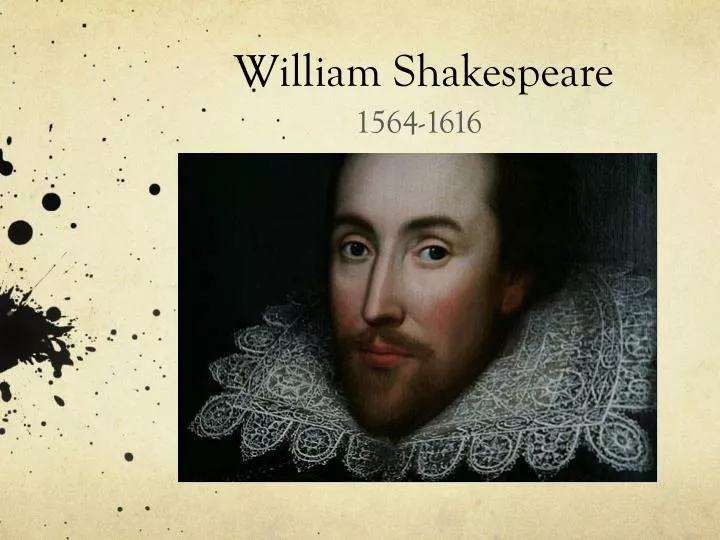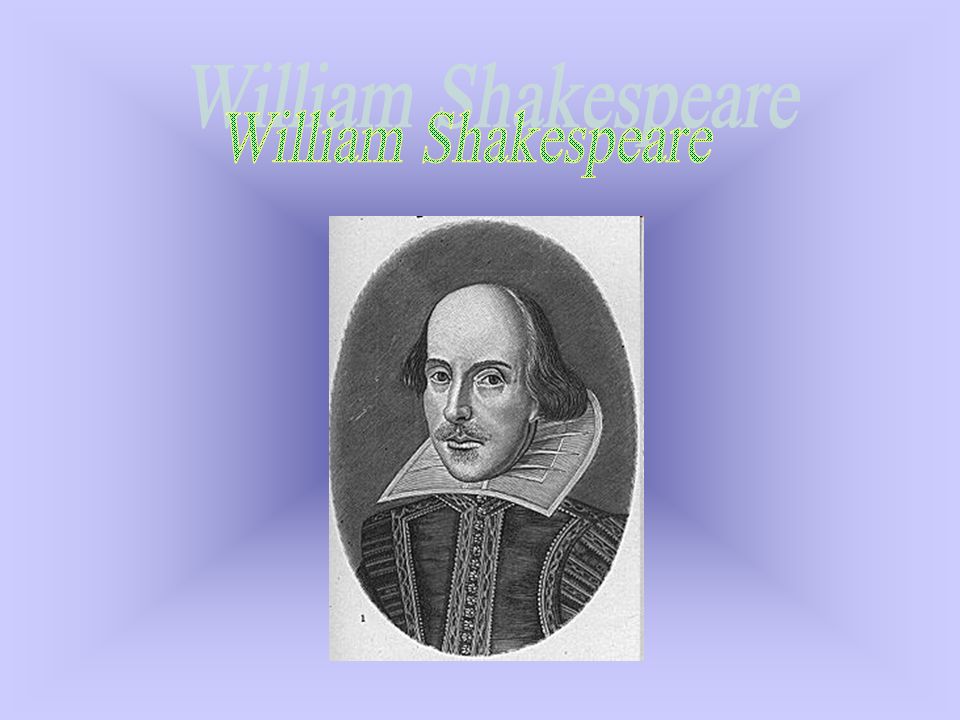Shakespeare powerpoint presentation
William Shakespeare was an English playwright and poet born in 1564 in Stratford-upon-Avon, England. He wrote 37 plays and 154 sonnets over the course of his career. Some of his most famous plays include Romeo and Juliet, Hamlet, and Macbeth. Shakespeare helped build the Globe Theatre in London where many of his plays were performed. He died in 1616 at the age of 52 in Stratford-upon-Avon. Read less


More Related Content
- 1. EDUCATONAL TECHNOLOGY SUBMITTED BY : RINCY MELVIN ENGLISH 16515359006 CHRIST NAGAR COLLEGE OF EDUCATION
- 2. TOPIC WILLIAM SHAKESPEARE
- 4. SHAKESPEARE William Shakespeare was born on 23 April 1564. He was an English poet, playwright, and actor, widely regarded as the greatest writer in the English language and the world's pre- eminent dramatist. He is often called England's national poet, and the "Bard of Avon“. His extant works, including collaborations, consist of approximately 37 plays, 154 sonnets, two long narrative poems, and a few other verses, some of uncertain authorship.
- 5. EARLY LIFE William Shakespeare was the son of John Shakespeare, an alderman and a successful glover and Mary Arden, the daughter of an affluent landowning farmer.He was born in Stratford-upon- Avon and baptised there on 26 April 1564. Although no attendance records for the period survive, most biographers agree that Shakespeare was probably educated at the King's New School in Stratford.
- 6. SHAKESPEARE’S HOUSE
- 7. MARRIED LIFE Shakespeare married Anne Hathaway, at the age of 18. He had three children: Susanna, and twins Hamnet and Judith. Sometime between 1585 and 1592, he began a successful career in London as an actor, writer, and part- owner of a playing company called the Lord Chamberlain's Men, later known as the King's Men.
- 8. THE 37 PLAYS…. 1. All's Well That Ends Well 2. As You Like It 3. The Comedy of Errors 4. Cymbeline 5. Love's Labours Lost 6. Measure for Measure 7. The Merry Wives of Windsor 8. The Merchant of Venice 9. A Midsummer Night's Dream
- 9. 10. Much Ado About Nothing 11. Pericles, Prince of Tyre 12. Taming of the Shrew 13. The Tempest 14. Troilus and Cressida 15. Twelfth Night 16. Two Gentlemen of Verona 17. Winter's Tale
- 10. 18. Antony and Cleopatra 19. Coriolanus 20. Hamlet 21. Julius Caesar 22. King Lear 23. Macbeth 24. Othello 25. Romeo and Juliet
- 11. 26.Timon of Athens 27.Titus Andronicus 28.Henry IV, part 1 29.Henry IV, part 2 30.Henry V 31.Henry VI, part 1 32.Henry VI, part 2 33.Henry VI, part 3
- 12. 34.Henry VIII 35.King John 36.Richard II 37.Richard III
- 13. THE TWO POEMS The Rape of Lucrece Venus and Adonis 154 SONNETS
- 14. WRITING STYLE William Shakespeare's early plays were written in the conventional style of the day, with elaborate metaphors and rhetorical phrases that didn't always align naturally with the story's plot or characters. However, Shakespeare was very innovative, adapting the traditional style to his own purposes and creating a freer flow of words.
- 15. With only small degrees of variation, Shakespeare primarily used a metrical pattern consisting of lines of unrhymed iambic pentameter, or blank verse, to compose his plays. At the same time, there are passages in all the plays that deviate from this and use forms of poetry or simple prose.
- 18. The Shakespearean Theatre By 1592, there is evidence William Shakespeare earned a living as an actor and a playwright in London and possibly had several plays produced. By 1597, the 37 plays written by William Shakespeare were published. By 1599, William Shakespeare and his business partners built their own theatre on the south bank of the Thames River, which they called the Globe.
- 19. Famous Quotes By Shakespeare ◦ To be, or not to be: that is the question. (Hamlet) ◦ All the world ‘s a stage, and all the men and women merely players. They have their exits and their entrances; And one man in his time plays many parts. (As You Like it) ◦ Some are born great, some achieve greatness, and some have greatness thrust upon them. (Twelfth Night)
- 20. Cowards die many times before their deaths; the valiant never taste of death but once. (Julius Caesar) There is nothing either good or bad, but thinking makes it so. (Hamlet) All that glisters is not gold. (The Merchant of Venice) Friends, Romans, countrymen, lend me your ears: I come to bury Caesar, not to praise him. (Julius Caesar) What’s in a name? A rose by any name would smell as sweet. (Romeo and Juliet)
- 22. Later Years And Death After 1610, Shakespeare wrote fewer plays, and none are attributed to him after 1613. His last three plays were collaborations, probably with John Fletcher, who succeeded him as the house playwright of the King's Men. Shakespeare died on 23 April 1616, at the age of 52. He died within a month of signing his will, a document which he begins by describing himself as being in "perfect health".
- 23. Beginning with the Romantic period of the early 1800s and continuing through the Victorian period, acclaim and reverence for William Shakespeare and his work reached its height. In the 20th century, new movements in scholarship and performance have rediscovered and adopted his works.

William Shakespeare
Jul 26, 2014
1.55k likes | 3.74k Views
William Shakespeare. 1564 -1616. Who is William Shakespeare?. Born in Stratford-upon-Avon, England in April, 1564 Studied basic Latin and Greek in grammar school When he was 18 he married Anne Hathaway Had 3 children: 2 daughters and a son
Share Presentation
- devious path
- particular belief system
- last century
- main acting troupes
- unnatural occurrences

Presentation Transcript
William Shakespeare 1564-1616
Who is William Shakespeare? • Born in Stratford-upon-Avon, England in April, 1564 • Studied basic Latin and Greek in grammar school • When he was 18 he married Anne Hathaway • Had 3 children: 2 daughters and a son • Son, Hamnet, died when he was 11 years old • Was living in London as an actor and a playwright by 1592. Anne and children stayed in Stratford
Shakespeare’s London • England was becoming a powerful nation under Queen Elizabeth I • London was a bustling, exciting centre of commerce, full of travelers • London’s stages boasted some of the greatest plays and actors to be found – troupes of actors traveled to London from all over to find work in its two famous theatres. • Famous playwrights included Christopher Marlow, Thomas Kyd, and William Shakespeare • This was a sketchy time for actors – their livelihood was always at risk: the religious leaders condemned the theatre “for encouraging immorality and idleness among the London populace” (Simply Shakespeare). Theatres were closed frequently – political unrest, times of plague. • The arts had many rich patrons who paid for plays, including the Queen
The Theatres Two theatres thrived during the mid-late 1500’s:the Rose, and the Theatre Two main acting troupes (archrivals) played at both: The Lord Admiral’s Men, and The LordChamberlain’s Men. Shakespeare was both a founding member of the Chamberlain’s Men, and the company’s main playwright. By 1597 Shakespeare had written Romeo and Juliet, The Merchant of Venice, and A Midsummer Night’s Dream. The Chamberlain’s Men had a dispute with the landlords of the Theatre. Since they owned the actual building, they took it apart, and re-built it further south in London. The new theatre was known as The Globe. At The Globe – most of Shakespeare’s greatest plays debuted, including Hamlet, Macbeth, Twelfth Night, and King Lear In 1603 – after the Death of Queen Elizabeth I, Shakespeare’s acting troupe changed it’s name to the King’s Men, and became the official company of the new monarch, James I.
Attending Shakespeare’s Plays • Attending a play in Elizabethan London was very different than attending a play today. • All of London society went to the theatre: merchants, prostitutes, lawyers, laborers, and visitors from other countries. • Your social status dictated what you would pay, and where you would sit. Poorer merchants would be crowded on the floors, with no seats – called ‘groundlings’. Could be up to 1000 people crammed in there. There was no roof, so these people are exposed to the weather. • The more wealthy people would sit in boxes surrounding the stage, no more than 35 ft away. These boxes were stacked vertically, and could hold another 2000 people. The seats directly behind the stage were reserved for royalty and the nobility. Here, they can see everything, and be seen by everyone. • The stage was quite bare, and the audience had to visualize the setting of the plays. The stage was covered with a canopy called ‘heaven’, that was painted with the sun, moon and starts. ‘Hell’ was the area directly below the stage – there was a trapdoor leading underneath. • Actors are exclusively male, and they often doubled up on parts. Young boys played female roles until their voices changed.
HAMLET A Tragedy by William Shakespeare
A Little History… • The story first appears in HistoriaDanica by Saxo Grammaticus – a 12th Century Danish historian – where the Prince Amleth, whose father, the king of Jutland, was murdered by King Fengo, his brother. • There are several differences: • no ghost • no uncertiainty: the murder of Amleth’s father is public knowledge • No problem of conscience: revenge was not a violation of moral or religious lay, but filial obligation • Tale is then retold by Francois do Belleforest in the 1576 publication of HistoiresTragiques. • The actual date of the completion of Shakespeare’s Hamlet is unknown, but wide belief is that it was written in 1601 following both the death of Shakespeare’s son Hamnet, in 1596, and his father, John, in 1601. It was first published in a quarto volume in 1603. This original draft was modified twice, once in 1604 and then again in 1623.
Characteristics of Revenge Plays • Revenge drama is one of the oldest and most popular forms of drama; one that is mimicked and retold throughout the centuries. It embodies the following characteristics: • An individual response to an intolerable wrong or public insult. • Institutional channels are closed and revenge almost always follows a devious path. • The revenger is in the grip of an inner compulsion. • Revengers need their victims to know what is happening and why. • Revenge is a universal imperative more powerful than the pious injunctions of any particular belief system.
Shakespeare’s Elizabethan World • Shakespeare’s Hamlet was written at the end of the reign of Queen Elizabeth I (died 1603), before King James I came into power in England. • At this time, Elizabethans still possess a common concept of both macrocosm and microcosm. • Although there had been great religious upheaval in the last century as initiated by Martin Luther, planted in England by Henry VIII, and then continued by Queen Elizabeth I, the deeply rooted traditions and beliefs of the English population did not change overnight. • The Elizabethan people are still very superstitious, and put a great deal of belief in the Ptolemaic theory of a theocentric cosmos which had planet Earth at its center. Within this belief, is what is known as “The Chain of Being”
The Chain of Being • Everything in the Universe, from God and the Cosmos right down to the soil and rocks of the earth fits into a hierarchy. • This hierarchy extends to incorporate the Order of living things, and binds facts and values of the time. • There is great emphasis on Reason and Order in the Universe, and there is believed to be a tripartite balance between God and the Cosmos, Earth and Nature, and Man and Society. If one of these elements is thrown out of balance, the other two will be affected as well, resulting in unrest and unnatural occurrences until order is restored. • To outrun reason, as Shakespeare’s tragic characters do, is to: violate Nature itself; lose the bearings of common sense and custom; and move into a spiritual realm bounded by irrational hell one way, and rational grace of faith the other.
The Universe and the Supernatural • Elizabethans believe in a very ordered universe: everything in its place, fulfilling the role and function it was meant to. God *Also order of human senses, the Angels King or Queen elements of the earth, and the Man Nobility Father humours within the body. Animals Knights Mother Plants Gentlemen Children Inorganic Matter Poor Servants Chaos As long as each piece stayed in its place, the universe existed in harmony. If someone tried to change the order of things, trouble would ensue and things would fall into chaos. In Elizabethan England, belief in witchcraft, ghosts, fairies, devils, elves and the personification of death was generally accepted.
The Universe as we know it:
VersusthePtolemaic Model The Sun Earth The Moon Planets
Four Alchemical Elements Fire (Highest but most volatile element, closest to heavenly matter that composes spiritual ether and stars; its natural state was warm/dry) Air (Second ranking element; Natural state: warm/wet) Water (Earth naturally sinks below water, so water is higher in status. Natural state: cool/wet Earth (Lowest but most stable element, closest to base desires. Natural state: cool/dry)
The Four Bodily HumoursFrom the Latin Humoris: “liquid” • Choler (called Yellow Bile in some models)liquid in the body that caused irritability and anger • Tears (in some models, Black Bile) liquid in the body that caused melancholy, sadness, and depression) • Blood (corresponded to excitement, energy, sexual arousal, happiness, desire for activity) • Phlegm (corresponded to lethargy, boredom, inaction, fatigue, sleepiness) The "humours" gave off vapors which ascended to the brain; an individual's personal characteristics (physical, mental, moral) were explained by his or her "temperament," or the state of thetperson's "humours." The perfect temperament resulted when no one of these humours dominated. By 1600 it was common to use "humour" as a means of classifying characters; knowledge of the humours is not only important to understanding later medieval work, but essential to interpreting Elizabethan drama.
Keep in mind, all of creation was bound together. Whatever affected one thing affected other things in the Chain of Being. This was called a “Correspondence.” Three interlocking parts of the Chain corresponded to each other. These were: • Macrocosm (the universe, nature, and the skies) • Microcosm (the Human body as a map of the Universe) • Body Politic (the kingdom as a social institute, including its government and its citizens).
The Human Body was the Microcosm It connected to every part of creation. -Created in God’s Own Image -Set in the very center of creation -Given the position of primate over the animals -Given both soul and flesh. Immortal, never dying.... What would happen if the human body became corrupted?
Health and Balance When the humors are balanced proportionately in the human body, mankind is healthy, and experiences no negative or inappropriate emotions. When unbalanced, it was another story.
Unbalance Leads to Disease
...And to Civil Disorder
...And to Disorder in Nature Animals attacking people, eating their own young, stealing grain or crops, all these were signs of the fallen nature of the earth, and corresponded to breaks in the Chain of Being and disorder within the microcosm.
...And to disorder in the heavenly constellations.
The Tragic Hero • The Shakespearean Tragedy is essentially the story of one person, the hero, who is an exceptional being, has greatness, and is a person of high regard (has potential). • The story leads to and includes the death of the hero. • The death of the hero is a significant moment. There is a ritual element: the hero is a sacrifice. • The suffering and calamity are unexpected and contrast with previous happiness or glory.
The hero’s destiny is not entirely or clearly God-given; there is an element of choice. • The calamities of tragedy do not simply happen; they proceed mainly from the actions of humans. • The hero has a tragic flaw (or hamartia) which brings him to ruin; he contributes to his own downfall. So there is a causal connection between character and destiny. • The fate of the hero affects not only himself, but others (In Shakespeare’s tragedies, usually the whole nation or empire). • Regeneration or renewal follows catastrophe; the moral order is restored.
The Design of Shakespearean Tragedy
1-Revenge Plot 2-Norwegian Subplot 3-Romantic Subplot Structure of Hamlet 3-Open rejection of Ophelia 1-Play within the play: King’s guilt established 1-Failure to kill Claudius at prayer 1-Death of Polonius: interview with mother; second appearance of ghost Crisis: Act III 1-Plan-Play 2-Return of ambassadors 1-The antic disposition Falling Action: Act IV 1-Banishment 2-Fortinbras crosses Denmark 3-Madness and death of Ophelia 1-Return of Laertes and Hamlet 1-Claudius’ Scheme Complication: Act II 3-Advice to Ophelia; departure of Laertes 2-Dispatch of ambassadors to Norway 1-Appearance of Ghost Catastrophe (Climax) and Outcome: Act V Exposition: Act I 3-Funeral of Ophelia 1-Duel; death of Claudius, Gertrude, Laertes, Hamlet 2-Arrival of Fortinbras Introduction of main characters Establishment of plots
Who’s Who ROYALTY Old King Hamlet: dead Hamlet: son of Hamlet and Gertrude Claudius: brother of Old Hamlet murderer of Old Hamlet new King – marries Gertrude Queen Gertrude COURTIERS (NOBLES) Polonius: Nobleman, aid and confidant of Claudius Laertes: son of Polonius, duels Hamlet at Claduius’ request. Horatio: good friend and confidant of Hamlet Wife is dead Ophelia: daughter, romantic connection to Hamlet. Voltimo Reynaldo Osric Rosencrantz and Guildenstern: old friends of Hamlet’s, but back on Claudius’ request. Over in Norway… King Fortinbras: died in duel with Old King Hamlet Prince Fortinbras SERVANTS The Players Gravediggers SOLDIERS Marcellus Bernardo Francisco
Major Topics/Themes to watch for: • Death Corruption Evil Immorality The Nature of Man • The Search for Identity Fate Parental Expectations Revenge • Supernatural Loyalty Deception The making of moral choices • Hesitation Self-reflection Madness Despair • Hamlet suffers from melancholy and indecision, fatalism, cynicism, general disillusionment with humanity, the question of his sanity or insanity, theavenging of his father’s death. • Soliloquies are largely important and reveal a great deal about Hamlet’s state of mind and character traits • Hamlet contemplates: How should one behave? What should one believe? How can one live in an inherently evil world?
Let’s Review Some Literary Terms • Soliloquy – a speech delivered while the character is alone on the stage in order to reveal his/her inner thoughts to the audience. (similar to a voice over in a film) • Aside – a remark made by a character and intended to be heard by the audience, not the other characters on stage. This is like a brief inner thought. • Imagery - the use of figurative or descriptive language to create a mental picture or emotional response. • Pathos – a feeling of pity or compassion is evoked in the audience. This may be for a specific character or a situation. • Hubris – Pride or overconfidence which often leads to the hero’s destruction. This is a specific tragic flaw.
Foil – a character who reflects or highlights, by comparison, the traits of another character. • Pun – a play on words, usually creating a humourous or ironic effect. • Prose – ordinary language • Blank verse – language that has a consistent rhythm (i.e. iambic pentameter) but does not rhyme. • Rhymed verse – language that has a consistent rhythm and rhyme + Shakespeare varies his use of verse in his plays. Lesser characters are written in prose, while more prominent characters are often written in blank or rhymed verse.
And so we begin!
- More by User

William Shakespeare. The Globe. What is the Globe?. Performing arts theater William Shakespeare made the theater world famous. It has become one of the four major theaters in London. Located in London. Why was the original globe theatre built?.
486 views • 10 slides

34. William Shakespeare. Hamlet, Prince of Denmark. Shakespeare’s England. At the time of Shakespeare, England was a small nation by modern standards, with a population of about five million.
756 views • 35 slides

William Shakespeare. Life and Times. What we know about Shakespeare comes from church documents and legal records. Some documents that we have are baptismal registration, marriage license, and records of real estate transactions. Family. Shakespeare was the 3 rd of eight children
904 views • 10 slides

William Shakespeare. I’m sure everyone has heard of William Shakespeare at some point in the life. On the next couple of slid shows you were learn lots of information about William Shakespeare and his life. William Shakespeare. Born April. 23,1564 Died April.23,1616
596 views • 5 slides

Introduction. William Shakespeare is considered the greatest playwright of all time. Yet today, 400 years later, controversy still surrounds the question of whether he is the true author of his plays and sonnets. As you investigate the information surrounding this controversy, you will objectively determine whether Shakespeare is innocent or guilty of these charges of plagiarism. .
344 views • 13 slides

William Shakespeare. A brief overview compiled by Rebekah Dement. “Silence is the perfectest herald of joy. I were but little happy if I could say how much.” -- Much Ado About Nothing. This is a quote from my favorite play by Shakespeare. Why?.
315 views • 12 slides

William Shakespeare. What We Know. William Shakespeare is known as one of the most influential writers in the English language. Strangely, much of his life is a mystery.
581 views • 29 slides

William Shakespeare. His life, and his work…. About his life.
487 views • 22 slides


WILLIAM SHAKESPEARE
WILLIAM SHAKESPEARE. EARLY YEARS. William Shakespeare was the son of John Shakespeare, a yeoman , and Mary Arder. He was born in Stratford on Avon , probably on 23 April 1564, in St George’s Day , which is also said to be the date of his death , but in 1616.
410 views • 19 slides

William Shakespeare. (1564-1616). Parents. William Shakespeare was the son of John Shakespeare, a successful glover and Mary Arden, the daughter of a farmer. He was born in Stratford-upon-Avon and baptised there on 26 th April in 1564. Childhood.
724 views • 9 slides

William Shakespeare. 1564-1616 Stratford-on-Avon England. Shakespeare's birth place. Stratford - on - Avon. Do you recognize these quotes?. Cowards die many times before their deaths; the valiant never taste death but once.
549 views • 30 slides

William Shakespeare. Sonnet 60. Sonnet 60.
481 views • 21 slides

William Shakespeare. Hamlet. To be, or not to be--that is the question: Whether 'tis nobler in the mind to suffer The slings and arrows of outrageous fortune Or to take arms against a sea of troubles And by opposing end them. To die, to sleep-- No more--and by a sleep to say we end
385 views • 16 slides

WILLIAM SHAKESPEARE. LIFE &WORK OF SHAKESPEARE.
343 views • 14 slides

William Shakespeare. By K.R. Contents. William Shakespeare’s Parents Shakespeare’s Traditions Shakespeare & His Plays Shakespeare’s Marriage Shakespeare’s Death. William Shakespeare’s Parents.
410 views • 7 slides

William Shakespeare. The Man, His Writing Style, His Theater Oh, and Romeo & Juliet, too. I. A little about Will…. Born April 23, 1564 (we think ) Lived in Stratford-Upon-Avon, a small town NW of London Attended school, studied Latin and literature
652 views • 42 slides

WILLIAM SHAKESPEARE. An Introduction to the Playwright and his Play, Julius Caesar. Biographical Information. Born: Stratford-Upon Avon, England April 23, 1564 Parents, John and Mary (Arden) Married Anne Hathaway, November, 1582 Three children: Susanna, Hamnet , and Judith
544 views • 22 slides

William Shakespeare. Early Modern England. Shakespeare’s Time: Late 16 th and early 17 th century England (1564-1616) Columbus “discovered” America in 1495. Queen Elizabeth I was ruler of England (1533-1603) and then James I (1603-1625)
595 views • 18 slides

William Shakespeare. -Born 1564, Stratford-upon-Avon -Playwright and poet -Known as the greatest writer in the English language -Known for his 38 plays and 154 sonnets -Plays are translated into every major language and are performed more than all other plays
902 views • 16 slides

WILLIAM SHAKESPEARE. Resume. William Shakespeare was born 23.4.1564 in Stratford whereupon Avonou . William Shakespeare death 23.4.1616 in Stratford whereupon Avonou . William Shakespeare was important English poet and dramatist.
642 views • 5 slides

William Shakespeare. About the author. It is believed that William Shakespeare was born in 1564, in Stratford-upon-Avon, Warwickshire, England. He was the eldest son of John shakespeare, a merchant.
632 views • 4 slides

- My presentations
Auth with social network:
Download presentation
We think you have liked this presentation. If you wish to download it, please recommend it to your friends in any social system. Share buttons are a little bit lower. Thank you!
Presentation is loading. Please wait.
William Shakespeare.
Published by Benjamin Sharp Modified over 9 years ago
Similar presentations
Presentation on theme: "William Shakespeare."— Presentation transcript:

William Shakespeare. The actual date of Shakespeare's birth is not known, but, traditionally, April 23, St George's Day, has been Shakespeare's accepted.

WILLIAM SHAKESPEARE ( ). No household in the English-speaking countries can be imagined without the Bible and the works of William Shakespeare.

William Shakespeare William Shakespeare. William Shakespeare was born in April 1564 in Stratford-Upon-Avon, in the centre of England. We don’t know exact.

Shakespeare’s Biography

WILLIAM SHAKESPEARE. LIFE &WORK OF SHAKESPEARE William Shakespeare (26 April 1564 (baptised) – 23 April 1616) was an English poet and playwright, widely.

British literature William Shakespeare Designed by Deryabina Nika Form 10”A” Center of Education №

“To be, or not to be: that is the question”-. “This above all: to thine own self be true.”-

William Shakespeare (baptised 26 April 1564; died 23 April 1616) was an English poet and playwright, widely regarded as the greatest writer in the English.

The Life & Story Of William Shakespeare By: Mackenzie Hughes, Ashley Glendon, & Shannon Harding.

Who is Shakespeare? William Shakespeare

William Shakespeare is one of the best writers in the world. William Shakespeare, English writer, stage actor and director, is generally regarded as the.

William Shakespeare I.V. Postyka, an English teacher Students of 9b class School 101, Krasnodar.

ENG 1D1 Mr. Dedato Selena and Cam

WILLIAM SHAKESPEARE. To the dismay of high school students everywhere. Reading Shakespeare is a requirement in nearly all high schools across the USA.

William Shakespeare was the son of John Shakespeare and Mary Arden. He was born on or near April 23, 1564 in Stratford-upon-Avon, London. At the age of.

The Most Excellent and Lamentable Tragedy of Romeo & Juliet ByWilliamShakespeare.

WILLIAM SHAKESPEARE made by: ANJA PINTAR & TEA TIZAJ 8.a šk. god /09.

Elizabethan era and theatre Life and work of William Shakespeare

William Shakespeare 2017/4/20.

The Life and Times of William Shakespeare
About project
© 2024 SlidePlayer.com Inc. All rights reserved.

IMAGES
COMMENTS
Feb 21, 2013 · William Shakespeare “Lost Years” The period between 1585 and 1592 is known as the “Lost Years” because there are no documentary records of Shakespeare’s activities 5. William Shakespeare Later Years • Moved to London around 1591 and became an actor • Worked with the Lord Chamberlin’s company of players, later known as the King ...
Dec 7, 2009 · 3. ChildhoodThe Stratford of William Shakespeare’s childhood was a peaceful town surrounded by farms, woods, fields, and the flow of the river Avon.William attended his first professional theater performance at the age of eleven.All of these performances had an impact on the early development of William’s dramatic and poetic interests.Claybourne, Anna and Treays, Rebecca.
Nov 16, 2015 · William Shakespeare was an English playwright and poet born in 1564 in Stratford-upon-Avon, England. He wrote 37 plays and 154 sonnets over the course of his career. Some of his most famous plays include Romeo and Juliet, Hamlet, and Macbeth. Shakespeare helped build the Globe Theatre in London where many of his plays were performed.
Interesting business topics for presentations; Dec. 4, 2024. Biology topics for presentation: Explore fascinating insights; Nov. 18, 2024. AI prompt examples for creating impactful AI presentations; Latest posts
Jul 26, 2014 · The new theatre was known as The Globe. At The Globe – most of Shakespeare’s greatest plays debuted, including Hamlet, Macbeth, Twelfth Night, and King Lear In 1603 – after the Death of Queen Elizabeth I, Shakespeare’s acting troupe changed it’s name to the King’s Men, and became the official company of the new monarch, James I.
1 William Shakespeare’s Life and Times April 23, 1564-April 23, 1616 Animation 2 Hall’s Croft Shakespeare was born in 1564 in Stratford-on-Avon Son of John Shakespeare & Mary Arden Studied Latin, Greek, World History, and British History at Stratford Grammar School Never went to college
Shakespeare’s theater troupe--renamed after King James inherits the throne from Queen Elizabeth ; No costumes, scenery, or lighting--so Shakespeare would have to rely on the words on the page ; Consisted ONLY of men and boys ; Grown men would play the parts of men ; Boys would play the parts of women and girls
Shakespeare Facts Born: 1564 in Stratford-Upon-Avon Father: John Shakespeare (leather-maker & bailiff) Education: 6-day/wk grammar school (age 6-16) Married: Anne Hathaway (26-years-old) William (18-years-old) Children: Susanna was born 6 months later and twins (Hamnet & Judith) in 1585
Shakespeare stays a member of this company until he retires in 1610. While in the company, Shakespeare made his living in three ways: he was part owner of the Globe theatre, he was an actor, and he was a playwright. During this time very little scenery was used on stage, but was accomplished by dialogue or conversation between characters.
3 William Shakespeare was the son of John Shakespeare, a successful glover and alderman originally from Snitterfield, and Mary Arden, the daughter of an affluent landowning farmer. He was born in Stratford-upon-Avon and baptised on 26 April His actual birthdate is unknown, but is traditionally observed on 23 April, St George's Day.This date ...